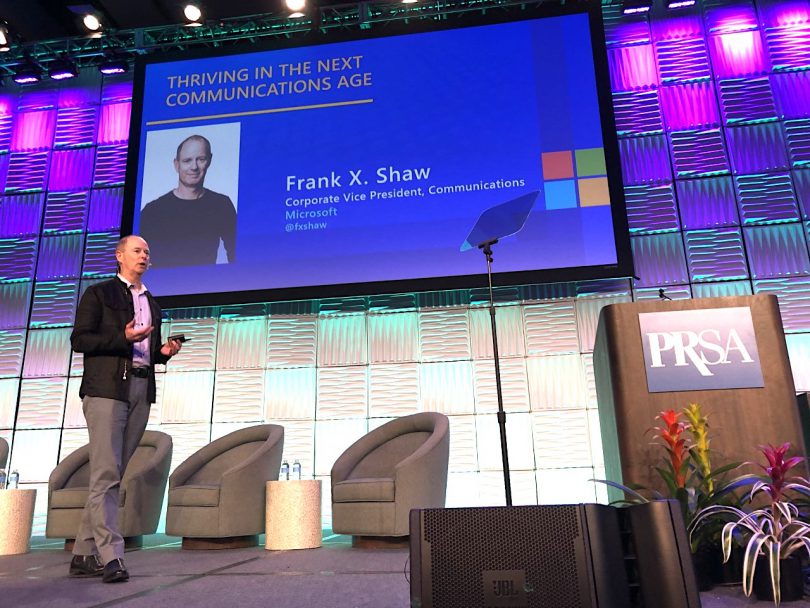The past doesn’t normally repeat itself, but it often rhymes, said Frank X. Shaw, corporate vice president of communications at Microsoft, during the lunchtime keynote session Monday at the 2019 PRSA International Conference in San Diego.
Shaw began by describing the three ages of communications: 1920 to 1960 as the age of propaganda (manipulating people through mass media), 1979 to 2009 as the age of exploration (from public relations to communications), and 2010 to the present day as the age of disinformation (digital technology, social media and “the art of the lie”).
The art of the lie extends far beyond politics, he said. How do we want to be defined as a profession?
“We are in the noisy ‘Disinformation Age,’” he said. Digital and social media have created an experience that’s like “pumping static into a room. You can’t think or absorb new information; you can’t tell what’s true and what’s not true.”
Shaw spoke of all of the information coming at us on social media; we’re absorbing the same information, mostly found on social media, but it’s coming at us hard and fast.
We need to ask ourselves these questions: What are the impacts on brands? What do we do with this information? What can the media do to preserve trust and authority?
“More than ever, companies will look to the communications function to help them thrive in this disinformation age,” he said. We need to have a symbiotic relationship with the media.
The media
As Shaw sees it, the role of the media is to do the following:
- Understand the adversary. Who are they? How do they protect themselves from them?
- Stop carrying the anti-truth virus. Know the difference between reporting and repeating.
- Turn off commenting systems. Weighing in on comments casts doubt; let the reporting speak for itself.
- Stop lending credibility. Data shows that debunking a claim allows people to make a statement.
“A lot of times, conflict drives revenue but at what cost?” Shaw asked. “There is an opportunity to look to communicators to help digest and understand the information.”
And that opportunity comes in the form of storytelling, diplomacy and truth, he said.
Storytelling
“In this communications age today, we need to build stories that are resistant to disinformation,” said Shaw.
There are three important things to remember about storytelling:
- Understand how stories travel. How are they consumed and by who?
- Synthesize the complex. “Expanimation” is a term used by Microsoft to tell complex stories simply, for example.
- Show… then tell. “Storytelling is the best thing that communicators can to do to be successful in this new age. We need to build stories that can’t be untangled and used against us,” he said.
Diplomacy
“Disinformation drives dissent and we need to build consensus,” Shaw said. “We need to apply diplomacy and separate ourselves so that we aren’t associated with being the problem. Because the messenger always gets shot.“
When it comes to the opportunity of diplomacy, “practice skills of diplomacy and pulling people together,” and remember to:
- Build consensus.
- Understand deception.
- Tell the truth
“Our reputation as communicators is dependent on being relentlessly honest,” Shaw said. “Trust is a common thread that runs through all of this. Understand the role we play in the world, and technology, asking questions and seeking the truth.”
In this disinformation age, truth becomes the biggest shield that we have. It’s OK to be wrong, but it’s never OK to be deceptive, he said.
As for the opportunity of truth, remember to:
- Be relentlessly authentic.
- Do not mislead.
- Stick to the lighted path.
This brings us to the topic of trust, which “will decay over time unless significant effort is placed on keeping it where it is,” Shaw said.
Trust
“If we, as communicators, stop providing ‘trust energy’ into our companies, it drops suddenly,” he said, likening trust to a helicopter — rather than an airplane — requiring constant work to stay aloft.
“Every day, we need to build trust, to tell stories, to illuminate the soul of the company,” Shaw said. We need to make sure that we’re doing things to help bring trust and truth to light.
This begins with your employees, as well as with shared experiences.
“Employees are your best defense against disinformation,” Shaw said. They are your first — and best — line of defense, so robust employee engagement needs to be a first-class effort.
“When we create that shared experience, we are protecting ourselves from disinformation,” Shaw said.
To thrive in the next communications age, we must make sure the work we do is valued.
“There is importance and necessity of finding meaning in our work. As the profession evolves, we have more opportunity to do this,” Shaw said. We have to anticipate communication in this age of disinformation.
As for the future of the profession, Shaw said: “We must define our work as purposefully — and relentlessly — shedding light on the truth.”
Amy Jacques is the managing editor of Strategies & Tactics.







